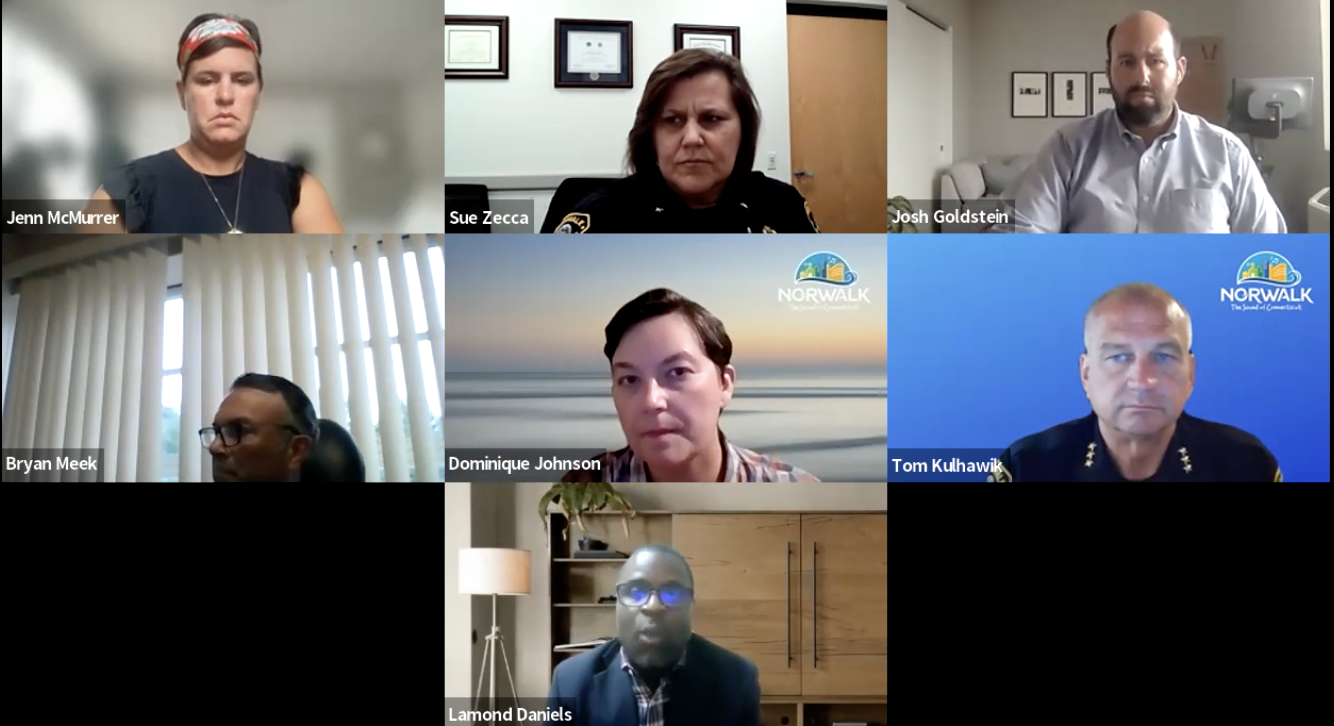Norwalk to Add Social Worker to Police Department
Norwalk plans mirror Stamford’s program that embedded a social worker and launched in May 2021.

In a few months, if a person experiencing a mental health issue or struggling with substance abuse calls 9-1-1 in Norwalk, a social worker could respond to their call along with police officers.
The Common Council approved spending $216,000 in American Rescue Plan Act funds for a one-year pilot program with Recovery Network of Programs to embed a social worker in the department.
“There was a lot of discussion over the past two years with police responding to mental health calls and the negative impacts that have occurred sometimes with those calls,” Norwalk Chief of Police Tom Kulhawik said to the Public Safety and General Government Committee on Tuesday.
Kulhawik said the department “looked at a variety of programs” to see what might work for Norwalk. Deputy Chief James Walsh reached out to Stamford and heard about the work they were doing with Recovery Network, a nonprofit social service agency which provides recovery services and support throughout the Greater Bridgeport area.
Kulhawik said that Stamford has had “great success with their program,” which embedded a social worker in their department and helped connect those who called for help with substance abuse and mental health issues, helping them find treatment and avoid the criminal justice system.
“A lot of these people as we know are frequent guests of the police,” he said. “The services just aren't there for these people.”
According to Stamford’s agreement to create the “Community Response Initiative,” “the goal of the program is to work collaboratively with law enforcement personnel in addressing the needs of the mental health/substance use community.” The embedded social worker would aim to “close the gap that currently exists for the mentally ill and substance use disorder population.”
The program aims to “lower law enforcement’s repeated calls for service, which will free up additional police resources to better serve its community.” The program allows for nonviolent offenders to be directed to treatment instead of arrested.
The $216,000 would cover one full-time, bilingual, social worker, a part-time social worker, benefits, equipment, and administrative costs.
“I think it’s an exciting time, it’s an exciting program to bring to the city,” Kulhawik said.
Norwalk’s Chief of Community Services Lamond Daniels worked with the police department as they thought of initiatives to bring to the city.
“It’s a game changer,” he said. “The research is clear—this model can make an impact in communities.”
Daniels said that the Recovery Network social workers will work with both the existing organizations that provide services in Norwalk, as well as connect Norwalk residents to their other partners depending on their needs.
“Our residents will now have direct access and preference to their wide network of services,” he said. “If the service does not exist locally, we want to partner with an entity to connect family and residents to these services.”
Members of the Common Council praised the program.
“This is something that I have been trying to work on ever since my first meeting with the chief of police,” Council Member Jenn McMurrer said. “I just thought ‘what a great thing to bring to our community.’”
Council Member Josh Goldstein said that this was a creative way to solve a need in the community.
“This is a big deal,” he said. “When we talk about coming up with innovative solutions to a lot of the issues that the police department faces—this is it.”
Kulhawik said he expects a social worker to be hired and embedded in about 3-6 months.
While the funding for the first year of the program is through the American Rescue Plan Act, Kulhawik said they would look for other grant funding—if the program is successful—to continue it, or ask for it as a part of the operating budget.
“I’m guessing more and more funds are going to be available for this kind of thing,” he said. “We’re looking at all aspects for where we can get funding for this.”
This year, Stamford received a three-year, $550,000 grant from the U.S. Department Justice to expand its initiative.
“The primary activities will be: to hire additional Master of Social Workers from our mental health partner, the Recovery Network of Program to embed in the Police Department, to, when safe and appropriate, respond to calls for service with the Police Behavioral Unit, to conduct mental health assessments, coordinate care, referrals and assertive linkage for Emotionally Disturbed Persons,” the proposal read.
Stamford estimated that the program will serve “thousands of individuals in the city over the duration of the three-year grant period.”



